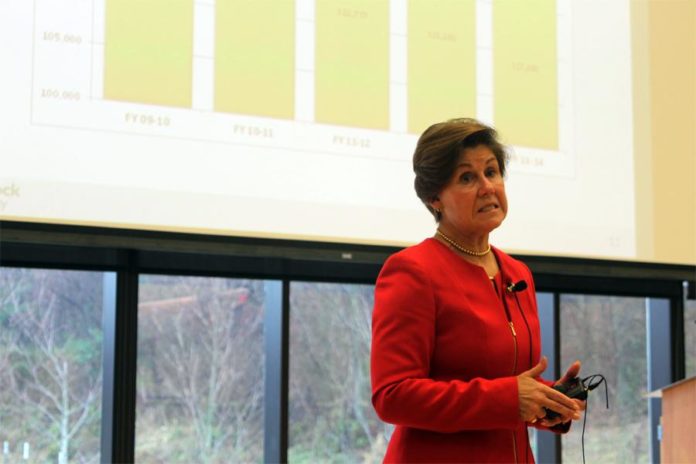President Cheryl J. Norton broke the news to the public during the town hall meeting in the ballroom of the Robert M. Smith Student Center that the university should expect cuts present in the 2014-2015 fiscal budget. “I have to tell you in all honesty we know that to address this size gap, we will have reductions in workforce, we will have to cut operation budgets, but we also will try to increase revenue.”
“I want you to understand how fluid this process is,” Norton said in reference to the timeline for the budget. She noted how difficult it is to plan a budget unaware of what funding would be like from the state, saying that she feels it is like she is being told “I want you to fix your Thanksgiving dinner but I’m not going to tell you how much money you have to spend.”
The anticipated budgetary gap of $10.9 million for the 2014-12015 budget is assuming level state funding, a minimal tuition increase, declining enrollment, personnel cost increases. “Those are assumptions that at this point in time have not been challenged,” Norton said.
As of Nov. 18, there have been three reassignments from low-enrolled programs to areas of higher need, one faculty retrenchment, 28 potential new faculty vacancies consisting of 12 confirmed faculty retirements and 16 pending retirements, and a reviewing of temporary faculty positions.
Retiring is an important part of balancing the budget, according to Norton.
“As people retire, obviously, we are working with the natural attrition of the university to make sure the balanced budget comes out,” she said.
The ultimate goal is to maintain a 20:1 student to faculty ratio. “Historically that’s proven to be a good academic and educational environment for our students and one that meets our needs,” she said.
Addressing the budget gap by all divisions of the University is something Norton emphasized so that the hardship is “not being shouldered on the back of one group” she said.
“I have asked each division across the university to cut their operational budgets by 9 percent.”
As another main source of revenue, enrollment was also discussed. Based on early indicators, Norton feels that enrollment is “looking more positive,” but maintains that it is important to remember “we’re starting from a very negative location.”
“Perhaps we’ve stopped the bleeding and that’s our first goal to stop the bleeding,” Norton said.
She also addressed some of the 200 recommendations received from the online submission box for the budget that was highlighted on the Slippery Rock University webpage as an opportunity for the community to have an input in the budget process.
The form was available from Aug. until Nov. and input is still welcome. Norton broke down the contributions in terms of implementing or ongoing, reviewing, or not feasible in order to provide information, clarification, and feedback to the community.
“We can’t do everything we’d like to do because sometimes, frankly, it’s just illegal,” Norton said as explanation for many of the not feasible options. These options may not be feasible due to factors out of the university’s control, no cost savings, or contrary to strategic priorities.
The presentation mostly explained why the not feasible options cannot be pursued, including building a parking lot at Kraus Hall’s location, using shovels over machines, closing the Cranberry center, eliminating FYRST seminar, offering associate degrees, pressuring the state to tax natural gas or leasing land for internships and jobs, stopping promotions and sabbaticals, and reducing admission requirements.
Norton said that building a parking location would cost more than the benefit. “It would cost about a million dollars and I’m not sure that we would get that money back and if we built a parking garage it would be a multimillion dollar expenditure,” she said. She also discussed the possibility of charging more than just students to be able to park on campus. Norton also explained that the cost for not using machines for things like snow would require more labor for more hours and not save money.
The Cranberry Center, while offering programs for the university, is not owned by it. “First of all, we don’t own the Cranberry Center. It’s not ours, so we can’t close it,” Norton said. She believes that the Center can still be a profitable endeavor.
“[FYRST seminar] is not required.” Norton said that 95 percent of the students take the course and believes that the program is important in helping new students to overcome the barriers of a new culture and community. She sees it as a very effective tool nationally in helping students to be successful.
The associate degrees, Norton feels, would not be successful for Slippery Rock University because of the offerings from community colleges. Finally, Norton stated that the university is not going to advocate for what the commonwealth does as far as natural gas is concerned. “Folks in all honesty we are not an advocacy institution,” she said. She added that if an individual feels strongly about this topic they can discuss it with the state as an individual.
The ideas implemented or ongoing discussed included going green, reduced hiring, developing branding that expands beyond a “Premier Residential Institution.”
The only two ideas under review that the president discussed were creating a capital campaign and creating an online education program similar to Southern Hampshire University model.
She explained that a capital campaign costs money to start up but does have a potential to generate revenue. The online education program is something Norton said would need to be discussed before moving forward.
Norton thanked the public for all of their ideas and comments in the budget making process.








